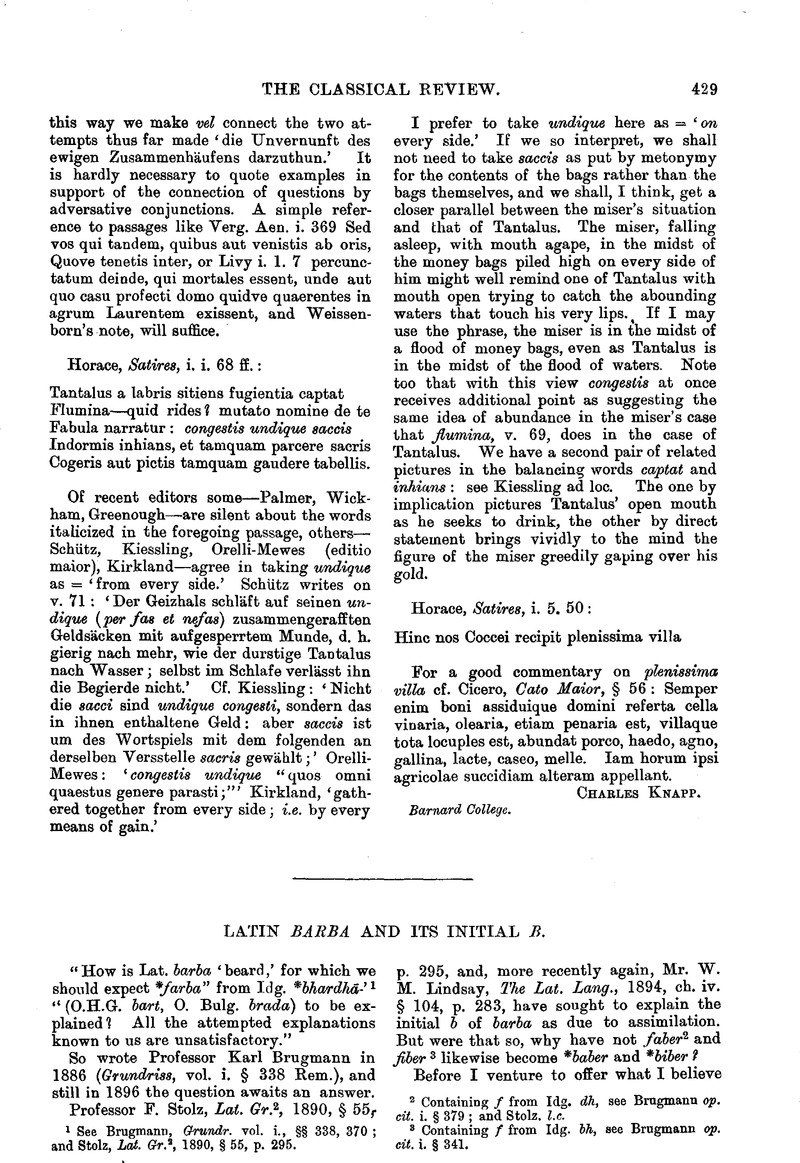No CrossRef data available.
Article contents
Latin Barba and its Initial B
Published online by Cambridge University Press: 27 October 2009
Abstract

- Type
- Other
- Information
- Copyright
- Copyright © The Classical Association 1896
References
page 429 note 1 See Brugmann, , Grundr. vol. i.Google Scholar, §§ 338, 370; and Stolz, Lat. Gr.2 1890, § 55, p. 295.
page 429 note 2 Containing f from Idg. dh, see Brngmann op. cit. i. § 379; and Stolz. l.e.
page 429 note 3 Containing f from Idg. bh, see Brugmann op. cit. i. § 341.
page 430 note 1 Of the Latin proper-names formed on barba (e.g. Barba, Barbo, Barbatus, Barbula, Ahenobarbus) Barbatus is, I think, the only one occurring on inscriptions so early as the ‘Inscriptiones vetustissimae bello Hannibalieo quae videntur anteriores’ (= C.I.L. i. Pars Prior), and therefore the only one which is of use in the present enquiry.
page 430 note 2 For b was the regular representative of Idg. bh in Prim. Celtic; compare e.g. O.Ir. bri gen. breg ‘mountain,’ Gall, brigi (in Brigiani, Are-brigium): Skr. bṛh-ánt- ‘great, high,’ Armen. barjr ‘high,’ root-form *bhṛĝh- (see Brugmann, op. cit. vol. i. § 341).
page 430 note 3 ‘Brennus,’ or, to be strictly correct, ‘ The Brennus’ (Brennus merely signifying ‘king’ or ‘chief’).
page 430 note 4 See Müller, F. Max, Lectures on the Science of Language (new edition 1882), vol. i. Lect. v., p. 225 noteGoogle Scholar.
page 430 note 5 If not too fanciful, an argument in favour of the earlier date, 390 B.C. may be drawn from the familiar legend that it was to the stroking of the beard of M. Papirius by one of the invading Celts and the consequent retaliation wherewith the latter sought to avenge the insult, that the general slaughter of the aged Roman senators who had refused to leave their ancestral halls was due (see Arnold, T.History of Rome 5, vol. i. ch. xxiv. pp. 543–545)Google Scholar.
page 430 note 6 Latin aurum was borrowed by the Celts from Latin [after the date of ‘rhotacism,’ concerning which see the second of ‘Two Papers on the Oscan Word Anasaket’ (London: D. Nutt, nearly ready) § 7, note] at “the time of the great Celtic movement southwards … which introduced the black day of Allia (390 B.C.) into the Roman Calendar.” See O. Schrader, Prehistoric Antiquities of the Aryan Peoples 2, Engl. ed. 1890, Part iii. ch. iv. p. 177.
page 430 note 7 This possibility has already been noticed by King, and , Cookson, Sounds and Inflexions in Greek and Latin, 1888, p. 126)Google Scholar.
page 430 note 8 The word gladius occurs in the Annales of Ennius (239–169 B.C.), while the diminutive Gladiolus (γ χειρςιον) is found as the title of a comedy of Livius Andronicus (flor. 240 B.C.). It is thus obvious that the word (if a loan-word) must have been borrowed at a fairly early date.
page 430 note 9 At what date was the word barbarus borrowed by Latin from Greek? (For the fact of its having been so borrowed see Stolz, Lat. Gr.2 § 42, p. 283). Was it borrowed so early as the first half of the fourth century B.C.? And, if so, could the transition of Lat. *farba to barba under the influence of Celtic possibly have been aided by the common use of the word barbarus among the Romans as an appellation of the Celts?




